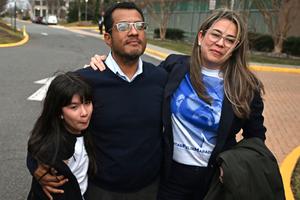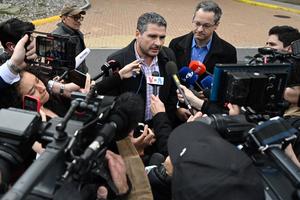Catholic Pro-Life Leaders Energized by Hope and Prayer for a Post-‘Roe’ World at 2022 March for Life
‘The palpable enthusiasm is really just incredible,’ March for Life President Jeanne Mancini told the Register about the prospect of overturning legal abortion’s constitutional foundation.

WASHINGTON — The 2022 March for Life was full of renewed excitement and hope Friday, as it was the first fully in-person march since the beginning of the COVID-19 pandemic — and many participants hoped it might be the last March for Life to protest the 1973 Roe v. Wade decision federally legalizing abortion.
That’s because the hope of overturning Roe hung in the air, with the Dobbs v. Jackson Women’s Health case before the Supreme Court. In oral arguments in December, five of the nine Supreme Court justices signaled willingness to do away with Roe and return decisions on abortion to the states as they examined Mississippi’s 15-week abortion ban.
“The palpable enthusiasm is really just incredible,” March for Life President Jeanne Mancini told the Register at the event Friday. She said that compared to the truncated March for Life last year, where leaders of the movement gathered in person at an event that for most others was restricted to virtual participation, “seeing the young people today is so energizing.”
In regards to the Dobbs case before the Supreme Court, Mancini said it would be “monumental if Roe v. Wade is overturned.” In that event, she continued, the March for Life is “analyzing all of these different possibilities” for the timing and focus of future marches. She said that if Roe is overturned, there will also be a backlash that the pro-life movement would have to contend with, including “bills put before Congress immediately that are very pro-abortion, and we’ll see new lawsuits that are put before the Supreme Court.”
Mancini added that “the March for Life began a state initiative six years ago, so I think that state marches will be critically important. We’re hoping to be in all 50 states in the next seven years, but I also see a federal need being critically important, as well.”
Legislating With Impact
Marjorie Dannenfelser, president of the pro-life Susan B. Anthony List, told the Register that pro-life advocacy “is going to completely change” if Roe is overturned. “The hope is dramatically different from what it has been,” and “when we advocate to pass laws that save lives, those laws will go into effect and will actually save lives.”
Advocacy for women in need will grow commensurately, she stressed. “It’s always been there, but when we go from the argument being academic in terms of legislation to real,” there will be “great focus on how to serve women and unborn children.”
She added that there will be “all eyes on this coming midterm election because when we have the opportunity to save lives, we cannot allow it to get buried in an election where our candidates’ views get buried because the other side is on the assault. And on the defense, we’ve got to be strong — we are preparing those [pro-life] candidates.”
Catholic U.S. Rep. Chris Smith, R-N.J., told the Register Friday that with Dobbs his hope is that “the court will say, just like with slavery and some other egregious human-rights abuse in our past, that this is a human-rights abuse in our present and that it is equally injurious to babies and mothers.”
He said that if Roe is overturned, “we need to be ready to legislate, to advocate, as never before. The distortions will go on by the other side, as we’re already beginning to see,” but he said it will be an opportunity for “a national debate on abortion. We’ve never had it. There’s a chilling effect so often on new bills that are introduced.”
Focus on Pro-Life Pregnancy Centers
Father Mike Schmitz, known for his The Bible in a Year podcast and popular YouTube channel, spoke with the Register prior to giving remarks at the rally. He said that if the pro-life movement’s hopes are realized with the overturning of Roe, the pro-life movement will intensify existing efforts to help mothers in need.
“One of the accusations against the pro-life movement is that we’re only concerned about getting babies born, but not concerned about children or mothers after,” he said. “If you look at what the pro-life movement actually does, that’s obviously false. There have been so many pro-life organizations that have spent their entire lifetimes doing the post-birth work.”
He said that those groups have “already paved the way for what it looks like to say, ‘How are we — and not only as a Church, but as a culture — going to support moms and dads who have chosen life?’”
Knights of Columbus Supreme Knight Patrick Kelly told the Register at the March for Life that if Roe is overturned, “advocacy will revolve around the pro-life pregnancy center.” The Knights of Columbus have been very active in pregnancy centers, he said, putting their 1,500th ultrasound machine in a pregnancy center last week. “It’s so important,” he said, “because those centers come around [and extend help to] the expectant mother, and they care for her, and they care for her unborn child.”
He said, for the Knights, their commitment to the pro-life issue goes back to their founding. “Blessed Michael McGivney founded the Knights to care for the family and to care for widows and orphans who were the most vulnerable in society at the time; but today those vulnerable, the most vulnerable in our society are the expectant mother and her unborn child.”
The Knights of Columbus released a poll through Marist Thursday, which found that 60% of Americans disagree with Roe’s central holding and believe abortion instead should be a state issue. Kelly said these findings are “very significant for where we may be going in this country in the Dobbs case and in a post-Roe world.”
Kelly added, “Our polling consistently shows that 70% of Americans are pro-life, that they feel there should be real, legal limits on abortion.”

















